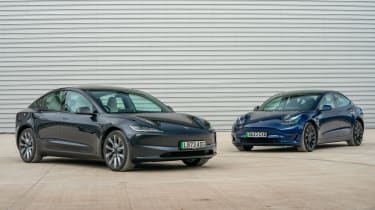Tesla Model 3: running costs & insurance
The Model 3 is generally affordable to buy and run, but it’ll cost an arm and a leg to insure
|
Insurance group |
Warranty |
Service interval |
Annual company-car tax cost (20%/40%) |
|
48-50 |
4yrs/50,000 miles |
Variable |
From £160/£320 |
Electric cars are notoriously expensive and Tesla CEO Elon Musk has long repeated the brand’s pledge of making EV motoring more affordable for all. This is reflected by a recent price cut that brought the base Model 3 in-line price-wise with electric family hatchbacks such as the Vauxhall Astra Electric and Volkswagen ID.3
Regardless, owning an EV can dramatically reduce your car ownership costs – especially if you’re a business driver. All electric cars fall into the lowest 2% Benefit-in-Kind bracket, with the Model 3 costing owners as little as £160 per year in company car tax.
Charging your electric car at home is typically much cheaper than filling up a petrol or diesel car at a petrol station; with the current average energy rate of 30p per kWh under the energy price guarantee, fully charging the base 58kWh Model 3 will set you back a maximum of £18, and even less if you have an EV-specific energy tariff. It’s worth noting that using public chargers – even Tesla Superchargers – can be just as, or even more expensive, than petrol.
Tesla Model 3 insurance group
Insurance groups for the Model 3 are pretty high: 48 for the base rear-drive Model 3 and the highest possible rating of 50 for the Long Range and Performance models, so coverage won't be cheap. Despite coming from a premium brand, the BMW i4 starts in just group 36, making it a chunk cheaper to insure, although top-of-the-range M50 models occupy group 43.
Warranty
Tesla offers a standard four-year/50,000-mile warranty, which is a bit low on the mileage side, but does exceed the three-year warranties offered by rivals Audi, BMW, Mercedes and Jaguar. The car's batteries get an eight-year/100,000-mile warranty and will also be refurbished or replaced by Tesla if they fall below 70% of their as-new performance within that time. That’s unlikely to happen, though, given Tesla’s excellent reputation for battery longevity.
Servicing
Tesla doesn’t state specific servicing intervals – the car will inform you if it needs attention. However, Tesla recommends checking the interior air filter and brake fluid every couple of years. Tesla has several service centres dotted around the country, and offers a mobile service where a technician will come to you.
Road tax
Like all electric cars, the Tesla Model 3 is exempt from road tax (VED) until 2025. It can also enter London’s Congestion Charge and Ultra-Low Emissions (ULEZ) zones for free, too.
Depreciation
Unless you’re looking to use the Model 3 as a company car, you’re likely curious to know what its residual values are like, especially as these can greatly affect monthly finance payments. Thankfully, the Model 3 does rather well in this regard; according to the latest industry data, it’ll retain anything between 46-48% of its value over three years and 36,000 miles of ownership. While some versions of the BMW i4 will hold onto around 60% of their initial asking price, it’s worth noting that the Beemer is quite a bit more expensive to buy in the first place.




